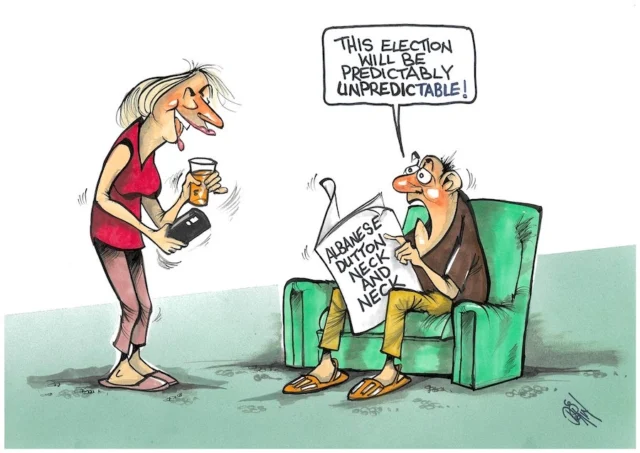
The ACT Integrity Commission continues it public examinations as it investigates how and why the tender for building works at Campbell Primary School was not given to the recommended tender applicant, local firm Manteena, but instead went to Lend Lease. Here legal columnist HUGH SELBY reviews Thursday’s revelations.
WHAT are the consequences of being compelled to answer incriminating questions?

Reading this week’s articles ( here and here) on the ACT Integrity Commission’s Operation Kingfisher hearings into what went on with the contract for the works at Campbell Public School in the covid years, did you wonder how witness Mr John Green (a pseudonym to protect his identity) could so readily fess up to telling the auditor-general’s team porkies on oath?
If you wondered, then you were probably thinking that our legal system doesn’t require a person to publicly admit to wrongdoing.
For the most part you are right. You are wrong where the law requires a person to answer one or more incriminating questions, but then prohibits those answers being used in evidence against them in any other proceedings, be those criminal or civil. The Integrity Commission Act is such a law (see sections 175 and 176).
We can assume that Mr Green has the benefit of those sections. We can also assume that the commission decided upon a public examination using Mr Green and his evidence as a pivot point about which other “persons of interest” would gather.
Though safe from the prosecution and/or disciplinary actions that would otherwise flow from his admissions about his misconduct before the auditor-general’s inquiry, Mr Green’s believability generally, or in particular respects, can still be attacked by those other “persons of interest”. Their aim is to throw sufficient doubt on his “credibility” that any prosecution or disciplinary action would likely fail.
Suppose that the commission makes a report about corrupt conduct that could lead to the Office of the Director of Public Prosecutions (ODPP) initiating a prosecution against one or more of the “persons of interest”.
With the new status of “the defendant”, their lawyers can make representations to the ODPP that there be no charges, or that charges be withdrawn, on the basis of an insufficiency of evidence such that no factfinder could convict.
An example of just that situation is the recent refusal by the Victorian DPP to accept the recommendations by the Special Investigator to bring charges against certain police who played a role in the use of Nicola Gobbo, defence solicitor as a police informant. Among the publicised reasons for that refusal was the belief that no factfinder would accept the evidence of Ms Gobbo.
The commission will have an investigative strategy
In Operation Kingfisher a key fact question is, did the chief of staff of the Minister for Education Yvette Berry, Josh Ceramidas, or the head and/or acting Director-General of Education, ever tell Mr Green that the contract was not to go to Manteena?
This does not mean that every witness suspected of doing something wrong will be compelled to answer incriminating questions and so gain the advantages that flow from that.
An investigative body, such as this commission, can manage the order in which it calls witnesses, and the order of the questions that it asks any witness. This helps to lock a targeted witness into a position that shows their misconduct, without having to ask them a direct question that calls for an admission to that misconduct.
The record of that questioning can then be used by prosecuting and/or disciplinary bodies against that witness.

Questioning of Mr Green by Josh Ceramidas’ counsel
Thursday’s public examination began with the minister’s chief of staff’s Josh Ceramidas’ counsel, Samuel Pararajasingham, continuing his questioning of Mr Green.
After a few minutes the public was excluded, probably while there were interactions between the commissioner and one or more of the lawyers.
When the public hearing resumed, counsel continued trying to undermine the strength of Mr Green’s allegations against the chief of staff.
Counsel pressed Mr Green to accept the difference between anyone in the minister’s office expressing a view about what was to happen with the contract, and a direction from the minister’s office that Manteena was not to get the contract. Mr Green agreed there was such a difference.
Trying to undermine the notion of a “direction” being given, counsel took Mr Green to specific questions and answers given in earlier private hearings and the public examination, with the intention, apparently, of showing that Mr Green’s recollections – with respect to his account of conversations with the chief of staff and heads of his department – have “improved” over time. (It is accepted that our memory of events does not improve over time.)
By “improvement” it means that his recollection of the words spoken improved. Whether or not that argument is successful, the repetition of that earlier evidence by Mr Green (as it was repeated in counsel’s questions) reinforced its content in listeners’ minds, including his evidence from 2022 that there was a direction.
Asked: “How do you now recall?” Mr Green gave a detailed credible answer. This was a question that should not have been asked. Counsel lost control of the witness and got an answer that ruined his aims.
Counsel seems to be asserting that Mr Green had, in effect, made up the conversation with the chief of staff about Manteena not getting the contract. The lines are clearly drawn: only one can be telling the truth.
Unsurprisingly, no other person of interest cross-examined Mr Green. Whether or not any had an application to question Mr Green refused is unknown.

Two unionists explain
CFMEU official Zachary Smith was called. He explained the “hostile” approach that Manteena had to the union.
He confirmed that he was dissatisfied with Mr Green’s response, as Registrar for the Secure Local Jobs Code [the Code], to complaints lodged with him by the union. Those complaints were not limited to Manteena. This confirms the earlier evidence of Mr Green.
While he recalls various discussions with the chief of staff about “overall capital works program for Education” he doesn’t recall – at any point – discussing tenders with him.
Mr Smith was asked about a meeting at the CFMEU offices with Mr Green and another person from Education.
This was soon after Mr Green moved to his Education job. At that meeting, recalls Mr Smith, Mr Green made a passing comment about knowing a director of Manteena and having a chat with him at a future barbecue about code compliance.
That passing comment, along with Mr Smith’s (and later Mr O’Mara’s) criticism of Mr Green’s failure as registrar to enforce the code, sits badly with any submission that Mr Green had his own reasons to be anti-Manteena.
Separate from those discussions there were questions about a draft letter intended to go from the union to the Education Directorate.
This letter mentions Manteena in the context both of seeking compliance with the code and a failed attempt to have Manteena engage in bargaining, with the union as the “eligible bargaining representative”. It seems that this letter was never sent.
Mr Smith accepted, following questions from the Commissioner Michael Adams, that Manteena’s refusal to have the union as agent, that being an approach also taken by some other builders, was “bad news” for the union.
Mr Smith accepted, too, that if Manteena didn’t get the contract that could be an inducement to other builders to accept CFMEU as the bargaining agent.
However, when the letter was drafted that was not a consideration. What mattered, Mr Smith said, was that the government demonstrated that compliance with the code mattered, that it would be enforced.
Mr Smith cannot recall any discussion by him with the Education Minister Yvette Berry or any of her staff, including the chief of staff, about either the code or Manteena.
There was no questioning by other counsel of Mr Smith.
Fellow CFMEU official Jason O’Mara was then called. He gave evidence about the same meetings that Mr Green and Mr Smith talked about.
Mr O’Mara thought the enforcement of the code by Mr Green, when he was registrar, was “terrible and it didn’t get any better”.
He was concerned that Mr Green wasn’t going to “get it right in his new role”. “It” being his preparedness to enforce the code within Education building projects.
He denies telling anyone who should be awarded the tender. The only person he spoke to within Education was Mr Green.
Mr O’Mara conceded that he would have made clear to Mr Green his strong negative views about Manteena, that they should not get government contracts. This followed a short, effective line of probing questions from the commissioner.
He has known the chief of staff for some years in the Labor Party context. They weren’t friends.
Mr O’Mara was happy to say that in a two-horse race he’d prefer Lend Lease to get the work because “they were a mile in front” on industrial issues of Manteena.
Only Mr Green’s counsel then questioned Mr O’Mara.
A surprise written statement from Josh Ceramidas
The day ended with the counsel for the chief of staff referring to a statement now submitted to the commission by the chief of staff, Josh Ceramidas.
That statement will be put on the commission website. I don’t know if the statement is sworn/affirmed or not. What seems to follow from his counsel’s summary of that statement is that Mr Ceramidas denies any conversation telling Mr Green that Manteena was not to get the contract for Campbell Primary School.
I am puzzled as to why Mr Ceramidas has now made a written statement. The answer may lie in matters discussed in private hearing. We must wait and see.
What is clear, as is said in the legal trade, is that “issue is now joined”.
What is unclear to the public is whether the totality of the evidence (much of which we do not know) will allow the commission to prefer Green to Ceramidas or vice versa.
“CityNews” legal commentator and former barrister Hugh Selby’s free podcasts on “Witness Essentials” and “Advocacy in court: preparation and performance” can be heard on the best known podcast sites.
Who can be trusted?
In a world of spin and confusion, there’s never been a more important time to support independent journalism in Canberra.
If you trust our work online and want to enforce the power of independent voices, I invite you to make a small contribution.
Every dollar of support is invested back into our journalism to help keep citynews.com.au strong and free.
Thank you,
Ian Meikle, editor









Leave a Reply